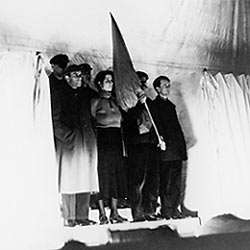Bertolt Brecht & Erwin Piscator
Experimental Theatre in Berlin during the 1920s
In Berlin of the 1920s Bertolt Brecht and Erwin Piscator created a new form of theatre out of experiences of the First World War and the social tensions of the Weimar Republic. Its aim was to show social reality in all its complexity, and it was based both on traditional forms of theatre and on performances not related to the stage in order to interrupt and to analyse the dramatic narrative. Thus the artists found ways only made possible by technological evolution.
The political aim of “epic theatre” was to activate the audience to try to change the world. Piscator who became famous for his intense use of film in stage performances tried to realise the idea of a highly technical “total theatre”.
Brecht, however, withdrew to the essential simplicity of the stage. Their revolutionary concept of theatre remains relevant today. For example, Lars von Trier’s much-discussed film “Dogville” is clearly informed by epic theatre.
The exhibition at the Austrian Theatre Museum showcases some of the epoch-making productions directed by Brecht and Piscator in order to document the development of epic theatre.
Stage photographs, stage models, little-known films and recordings provide a vivid image of this innovative phase of theatrical history. Works by George Grosz, John Heartfield, László Moholy-Nagy, Walter Gropius and Caspar Neher will also be on show.


